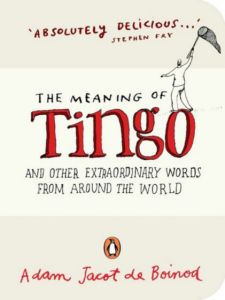"It all started when Adam Jacot de Boinod picked up a weighty Albanian dictionary and discovered no fewer than twenty-seven words for types of eyebrow and exactly the same number for varieties of mustache. What could it mean?" "His curiosity grew into a passion. No library was safe. His short list of favorites grew. Many words described strange or unbelievable things. What does it say about the Inuit that they have need for the word areodjarekput, meaning "to exchange wives for a few days only"? Or that there is a Pascuense word from Easter Island, tingo, which means "to take all the objects one desires from the house of a friend, one at a time, by borrowing them"? Other words expressed concepts that seemed all too familiar: We've all spent time with an ataoso, Central American Spanish for "one who sees problems with everything," or worked with a neko-neko, Indonesian for "one who has a creative idea which only makes things worse."" "He looked at languages from all corners of the world. He found plenty of words, of course, for strictly local concepts and sensations, such as the Hawaiian kapau'u "to drive fish into the waiting net by striking the water with a leafy branch." But others reinforced the commonality of the human experience. Haven't we all felt mukamuka, Japanese for "so angry one feels like throwing up," or scheiss-bedauern, German for "the disappointment one feels when something turns out not nearly as badly as one had hoped"?" "The English language has long plundered foreign cultures for new words. Here are some we missed. Arranged by theme so that you can compare attitudes all over the world to such subjects as food, the human body and sex and love, The Meaning of Tingo is a feast for word lovers, laughter lovers and wisdom seekers of all shapes and sizes."--BOOK JACKET.
| LoC Classification |
P326 |
| Dewey |
422 |
| Cover Price |
£12.00 |
| No. of Pages |
224 |
| Height x Width |
170
x
130
mm |
|
|
